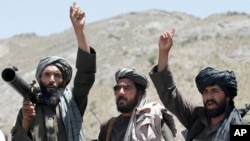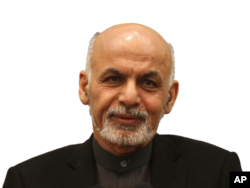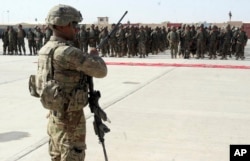The Taliban, in a so-called “open letter” to U.S. President Donald Trump, has called on him to help end what it denounced as a “futile” and “un-winnable” American war in Afghanistan.
A copy of the letter, written by Taliban spokesman Zabihullah Mujahid, was released to journalists Wednesday.
There has been no immediate reaction from the Trump administration.
The letter blamed the United States for starting the Afghan war 15 years ago and called the presence of “foreign invading forces” in the country the principle cause for the continued human and material losses being suffered by both sides.
“It is on these basis that we send you our message to control this war of occupation launched by your military,” Mujahid wrote, reiterating that the Taliban will not end fighting until all the U.S.-led forces are withdrawn from Afghanistan.
The U.S.-led international military coalition ousted the Taliban from power in 2001 to punish it for harboring and refusing to handover al-Qaida leader Osama bin Laden, who was wanted for plotting deadly terrorist attacks against American cities.
Corruption allegations
The Taliban letter has again accused the U.S.-backed Afghan national unity government of President Ashraf Ghani of being a “corrupt regime” that has lost public trust.
Trump stated almost nothing about his plans for the Afghan war during his election campaign. But hours after his inauguration last Friday, the new U.S. president apparently vowed to continue with the military campaign until victory.
“We are with you a thousand, a thousand, a thousand percent. You are doing just an incredible job. So, thank you all very much. We will see you and keep fighting. We are going to win, we are going to win, we are going to win, keep fighting,” Trump told U.S. soldiers in Afghanistan during a brief chat with them via satellite link.
Afghan officials are also reported as saying that in a phone call in December, Trump told President Ghani that “after an assessment” he would consider sending more American troops to Afghanistan. The Trump administration has not commented on those reports.
US Afghanistan mission
There are currently about 8,400 U.S. soldiers stationed in Afghanistan, along with some 6,000 soldiers from NATO member nations.
The forces are primarily there to train, advise and assist Afghan security forces in the battle against the Taliban under NATO’s Resolute Support mission. The U.S. military additionally is tasked with conducting independent operations against terrorists linked to al-Qaida and the Islamic State group in Afghanistan.
The Taliban made significant battlefield advances during 2016, when it killed more than 5,500 Afghan security forces in the first eight months of the year.
Tuesday, the Afghan defense ministry disclosed the Taliban has launched around 19,000-attacks throughout the country in the last ten months while government forces conducted roughly 700-counter-insurgency operations during the same period.
Currently, the Afghan government controls two-thirds of the population while roughly ten percent is controlled by the Taliban and the rest is contested, according to latest U.S. military assessments.
Earlier this month, a U.S. government watchdog outlined for President Trump critical areas threatening the Afghan mission.
Challenges ahead
The Special Inspector General for Afghanistan Reconstruction, John Sopko while releasing his assessments in Washington, said the Kabul government “still cannot support itself financially or functionally” and long-term assistance will be required for the country to survive.
But Sopko warned the new U.S. administration will also face challenges unless it effectively tackles rampant official corruption plaguing Afghan security institutions and the “bleeding ulcer” of drugs and narcotics in the country.
“(NATO’s) Resolute Support estimates that as much as 60 percent of the Taliban’s funding comes from poppy production, cultivation and taxation,” he observed.
The United States has “little to show” for roughly $8 billion it has spent since 2002 to fight narcotics in Afghanistan because the country continues to grow poppy at a near record level, said Sopko.
“Now policymakers should ask themselves if we are worried about illicit oil sales funding ISIS terrorists in Syria and Iraq why are we not as concerned about this key source of funding for the Taliban terrorists, funding which is only serving to prolong America’s longest war in Afghanistan.”






